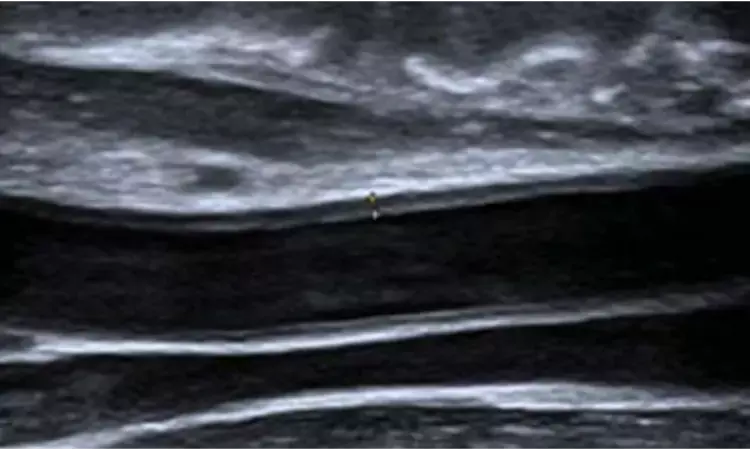- Home
- Medical news & Guidelines
- Anesthesiology
- Cardiology and CTVS
- Critical Care
- Dentistry
- Dermatology
- Diabetes and Endocrinology
- ENT
- Gastroenterology
- Medicine
- Nephrology
- Neurology
- Obstretics-Gynaecology
- Oncology
- Ophthalmology
- Orthopaedics
- Pediatrics-Neonatology
- Psychiatry
- Pulmonology
- Radiology
- Surgery
- Urology
- Laboratory Medicine
- Diet
- Nursing
- Paramedical
- Physiotherapy
- Health news
- Fact Check
- Bone Health Fact Check
- Brain Health Fact Check
- Cancer Related Fact Check
- Child Care Fact Check
- Dental and oral health fact check
- Diabetes and metabolic health fact check
- Diet and Nutrition Fact Check
- Eye and ENT Care Fact Check
- Fitness fact check
- Gut health fact check
- Heart health fact check
- Kidney health fact check
- Medical education fact check
- Men's health fact check
- Respiratory fact check
- Skin and hair care fact check
- Vaccine and Immunization fact check
- Women's health fact check
- AYUSH
- State News
- Andaman and Nicobar Islands
- Andhra Pradesh
- Arunachal Pradesh
- Assam
- Bihar
- Chandigarh
- Chattisgarh
- Dadra and Nagar Haveli
- Daman and Diu
- Delhi
- Goa
- Gujarat
- Haryana
- Himachal Pradesh
- Jammu & Kashmir
- Jharkhand
- Karnataka
- Kerala
- Ladakh
- Lakshadweep
- Madhya Pradesh
- Maharashtra
- Manipur
- Meghalaya
- Mizoram
- Nagaland
- Odisha
- Puducherry
- Punjab
- Rajasthan
- Sikkim
- Tamil Nadu
- Telangana
- Tripura
- Uttar Pradesh
- Uttrakhand
- West Bengal
- Medical Education
- Industry
Early treatment with statin reduces CV morbidity in Familial hypercholesterolemia, finds study

Familial hypercholesterolemia (FH) is an autosomal dominant disorder characterized by elevated serum low-density lipoprotein cholesterol (LDL-C) from birth onwards, and is at increased risk for premature atherosclerosis and early cardiovascular events. Subclinical atherosclerosis can be quantified non- invasively by measuring the intima-media thickness (IMT), the thickness of inner most two layers of vessel wall. IMT is usually measured in the carotid and/or femoral artery and has been proven to be a surrogate marker of the status and progression of atherosclerosis. Statins are the preferred pharmacological therapy in patients with FH to reduce serum LDL-C levels, cardiovascular disease (CVD) morbidity and mortality.
Kika van Bergen et al, conducted a systematic literature search using MEDLINE, EMBASE and ClinicalTrials.gov up to April 2020 for studies addressing IMT in FH patients and controls to look at progression of IMT in FH patients as compared to controls and also the response to treatment. A total of 42 studies having 6,143 participants were included.
Important observations from this study are as follows:
1) FH patients had a mean IMT difference of 0.11 mm in carotids as compared to unaffected controls.
2) FH patients had a mean IMT difference of 0.47 mm in femoral artery as compared to unaffected controls.
3) In age category of 1 – 20 years, a mean carotid IMT difference was 0.07mm between FH patients and controls whereas it is 0.16 mm in age category of 41 – 60 years
4) A smaller mean difference in carotid IMT in treated FH patients vs controls: 0.05 mm (p < 0.001), than in untreated FH patients vs controls 0.12mm (p = 0.009) was observed
Authors concluded that Familial hypercholesterolemia patients have a higher mean carotid and femoral IMT compared to unaffected controls and starting treatment early in patients with FH is preferred as progression of IMT thickness is slower in treated patients than untreated. However, despite treatment, IMT in treated FH patients is still thicker in comparison to subjects without FH.
Keywords: Familial hypercholesterolemia, CV mortality, statins, Intima medial thickness, LDL
Source: Journal of Clinical Lipidology, 10.1016/j.jacl.2022.01.009
MBBS, M. D. Respiratory Medicine
Dr Sravan Kumar V, completed his M. B. B. S from SRMC, Nandyal and M. D. in Respiratory Medicine from the JSS Medical College, Mysore. After completing MD. he worked as Senior resident in Kasturba Hospital, Manipal. He is actively involved in various research activities of the department. Currently he is working as senior resident in Mallareddy medical college for women, Hyderabad. He can be contacted at editorial@medicaldialogues.in.
Dr Kamal Kant Kohli-MBBS, DTCD- a chest specialist with more than 30 years of practice and a flair for writing clinical articles, Dr Kamal Kant Kohli joined Medical Dialogues as a Chief Editor of Medical News. Besides writing articles, as an editor, he proofreads and verifies all the medical content published on Medical Dialogues including those coming from journals, studies,medical conferences,guidelines etc. Email: drkohli@medicaldialogues.in. Contact no. 011-43720751


